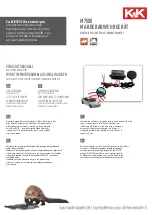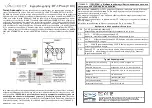
CB inherent time up to current interruption
2 periods (assumed rated frequency = 50 Hz)
Dropout time of CBFP function
1 period
Subtotal
65 ms
Security
Factor 2
Total (time T1)
130 ms
EXAMPLE (1/3-Pole Circuit Breaker)
Different T1 Times, Depending on whether the Start Was 1-Pole or 3-Pole:
The protection tripping can be 1-pole. 1-pole tripping results in a 1-pole AREC. The retripping prompted by the
CBFP should be 3-pole on principle.
Under these circumstances, the T1 time can be set to a small value (for example 50 ms) for a 3-pole start. The
T1 time for 1-pole start, however, must be set to the full clearance time (for example, 130 ms), because the 2
healthy phases are to be tripped only in case of a real circuit-breaker failure.
Parameter: Delay T2 for 1-pole trip, Delay T2 for 3-pole trip
•
Default setting
(_:114) Delay T2 for 1-pole trip
=
0.13 s
•
Default setting
(_:112) Delay T2 for 3-pole trip
=
0.13 s
This setting has to ensure that after opening of the local CB the function drops out reliably and that backup
tripping is avoided under all circumstances. The setting depends on the parameter
Retrip after T1
.
If T2 is started afterT1, there is no need to consider the time T1 for the setting of T2.
EXAMPLE
Determining the T2 Time that Reliably Ensures the Dropout of the CBFP with the CB Open:
Time of binary device output
(when tripping is caused by the device-internal
protection)
5 ms
CB inherent time up to current interruption
2 periods (assumed rated frequency = 50 Hz)
Dropout time of CBFP function
1 period
Subtotal
65 ms
Security
Factor 2
Total (time T2)
130 ms
If T1 and T2 are started in parallel, take into account the time T1 for the setting of T2.
EXAMPLE
Simultaneous start of T2 and T1
Time for a reliable dropout after the local CB has
opened
130 ms
Setting of T1
50 ms
Total (= T2)
180 ms
You can set different times for a 1-pole and 3-pole (multipole) start. In case of 1-phase short circuits – that do
not jeopardize network stability – it can make sense to allow more time to the local CB (for example, twice the
clearance time: 2 x 130 ms = 260 ms), expecting that the CB will open yet. Thus, tripping of the surrounding
CBs can be avoided.
Protection and Automation Functions
7.1 Circuit-Breaker Failure Protection
536
SIPROTEC 5, High-Voltage Bay Controller, Manual
C53000-G5040-C015-9, Edition 11.2017
Summary of Contents for 6MD85
Page 8: ...8 SIPROTEC 5 High Voltage Bay Controller Manual C53000 G5040 C015 9 Edition 11 2017 ...
Page 30: ...30 SIPROTEC 5 High Voltage Bay Controller Manual C53000 G5040 C015 9 Edition 11 2017 ...
Page 46: ...46 SIPROTEC 5 High Voltage Bay Controller Manual C53000 G5040 C015 9 Edition 11 2017 ...
Page 172: ...172 SIPROTEC 5 High Voltage Bay Controller Manual C53000 G5040 C015 9 Edition 11 2017 ...
Page 514: ...514 SIPROTEC 5 High Voltage Bay Controller Manual C53000 G5040 C015 9 Edition 11 2017 ...
Page 1056: ...1056 SIPROTEC 5 High Voltage Bay Controller Manual C53000 G5040 C015 9 Edition 11 2017 ...
Page 1092: ...1092 SIPROTEC 5 High Voltage Bay Controller Manual C53000 G5040 C015 9 Edition 11 2017 ...
Page 1204: ...1204 SIPROTEC 5 High Voltage Bay Controller Manual C53000 G5040 C015 9 Edition 11 2017 ...
Page 1238: ...1238 SIPROTEC 5 High Voltage Bay Controller Manual C53000 G5040 C015 9 Edition 11 2017 ...
Page 1252: ...1252 SIPROTEC 5 High Voltage Bay Controller Manual C53000 G5040 C015 9 Edition 11 2017 ...
Page 1256: ...1256 SIPROTEC 5 High Voltage Bay Controller Manual C53000 G5040 C015 9 Edition 11 2017 ...
















































